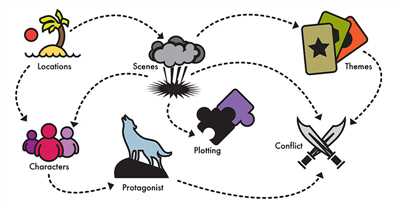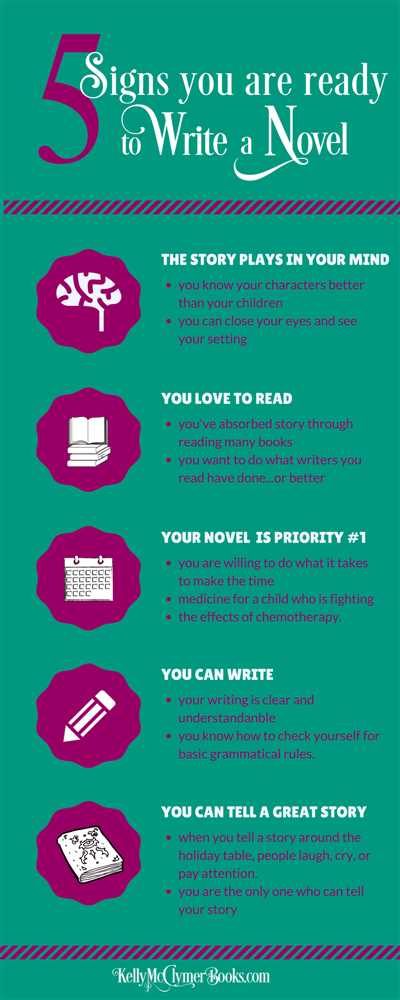
Writing a novel can be a daunting task, especially when it’s your first time. Many writers find themselves overwhelmed by the sheer magnitude of the project. However, don’t let that discourage you. With a few tactics and a little organization, you can write an amazing novel that will keep readers engaged from start to finish.
First and foremost, you need to find the time to write. This may seem obvious, but it’s a common stumbling block for many aspiring writers. While it’s true that life often demands much of our attention, it’s important to make writing a priority. Set aside dedicated time each day or week to work on your novel. This will not only help you stay organized, but it will also allow your creativity to flourish.
Once you’ve carved out the time to write, it’s necessary to find a quiet place where you can let your thoughts flow freely. Whether it’s a cozy corner in your home or a bustling café, find a space that allows you to focus. Eliminate distractions by turning off your phone and closing any unnecessary tabs on your browser. This will help you maintain a clear mind and stay in the flow of writing.
Now that you have the time and the space to write, it’s time to consider the basic structure of your novel. What kind of story do you want to tell? Who are your characters? What is the main conflict? These are the questions you need to answer before you even put pen to paper. Taking the time to plot out your novel will save you hours of frustration later on. Once you have a clear idea of where your story is heading, you can start writing with confidence.
As you begin writing, the most important thing to remember is to be yourself. Don’t try to mimic the voice or style of others. Your unique perspective is what sets your writing apart. Trust your instincts and let your creativity guide you. Write in a way that feels natural to you, and your readers will appreciate it.
While it’s important to trust your own voice, it’s also valuable to learn from others who have been down this path before. Take the time to analyze and understand the techniques that successful writers use. Read books on the craft of novel-writing, attend workshops or conferences, and join writing communities where you can share ideas and receive feedback. Learning from the experiences of others can help you hone your skills and become a better writer.
- How to Write a Book with Tactics from Bestsellers
- 1. Find your own voice
- 2. Do thorough research
- 3. Listen to your users
- 4. Use writing tactics from bestsellers
- 5. Keep your creativity alive
- The First Rule of Novel-Writing is Don’t Write a Novel
- Keep any research you need in an organized accessible place
- More Efficient Better Writing
- Video:
- How I wrote a novel in 5 weeks as THE SLOWEST WRITER IN THE WORLD
How to Write a Book with Tactics from Bestsellers
Writing a novel is a creative process that requires dedication and hard work. To write a book that stands out from others, you need to ground yourself in the tactics used by bestselling authors. There is much to consider when writing, but by following the tactics of those who have already achieved success, you can improve your chances of creating an amazing novel.
1. Find your own voice
When writing a novel, it’s important to find your own unique voice. Don’t try to copy the writing style of others; instead, let your individuality shine through. This will make your book more authentic and engaging for readers.
2. Do thorough research
Research is a valuable tool for novel-writing. Whether you’re writing historical fiction or a contemporary story, conducting research can help you bring realism and depth to your writing. Don’t be afraid to delve into different subjects and gather as much information as possible.
For example, if you’re writing a novel set in the 19th century, research the time period, societal norms, and even the language used during that era. This attention to detail will make your novel more immersive and believable.
3. Listen to your users
While writing, it’s important to consider your readers. Pay attention to their feedback and understand what they enjoy in a novel. This will help you write a book that will resonate with your target audience.
Additionally, consider feedback from beta readers or writing groups. They can provide valuable insights and suggestions to make your novel better. However, don’t blindly follow all feedback, as it is important to stay true to your own vision.
4. Use writing tactics from bestsellers
Take inspiration from successful authors by studying their writing tactics. See how they engage readers, build tension, or create memorable characters. While you shouldn’t copy their work, understanding their techniques can help you incorporate more effective elements into your own writing.
For example, consider how bestselling authors like J.K. Rowling or Stephen King create suspense in their novels. Analyze their use of pacing, foreshadowing, and plot twists to understand how you can do the same in your own writing.
5. Keep your creativity alive

Writing a novel can sometimes feel like hard work, but it’s important to keep your creativity flowing. Find ways to stay inspired and motivated. Whether it’s taking walks in nature, reading books from different genres, or participating in writing challenges, do whatever helps you stay connected to your creative side.
| Tactic | Description |
|---|---|
| Write every day | Establish a writing routine to keep yourself disciplined and make progress consistently. |
| Find a writing space | Create a dedicated space where you can focus on your writing without distractions. |
| Use writing prompts | When you’re feeling stuck, use writing prompts to spark new ideas and get your creative juices flowing. |
| Experiment with different styles | Don’t be afraid to try out new writing styles and techniques to keep your writing fresh and innovative. |
In conclusion, writing a successful novel demands hard work, research, and creativity. By studying the tactics from bestsellers and incorporating your own unique voice, you can position yourself for success. Take the time to understand what makes a novel engaging, and implement these tactics into your own writing. Remember, there’s no one-size-fits-all approach, so experiment and find what works best for you.
The First Rule of Novel-Writing is Don’t Write a Novel

When it comes to writing a novel, the first rule is simple: don’t write a novel. This might sound counterintuitive, but it’s an important principle to keep in mind if you want to create a successful piece of literature. Instead of focusing on the end product, you should concentrate on the process of writing itself.
Writing a novel isn’t just about putting words on a page; it’s about crafting a story, developing characters, and creating a world that readers can immerse themselves in. This requires a lot of time, effort, and dedication.
One of the most valuable things you can do as a writer is to understand the purpose of your novel-writing. Is it to share an amazing story that has been in your head for years? Is it to analyze a particular aspect of society? Is it to help others navigate the ups and downs of life?
By answering these questions, you can better determine what kind of book you want to write and what kind of impact you want it to have on readers. This helps you stay focused and motivated throughout the writing process.
When you write a novel just for the sake of writing one, without a clear purpose or direction, it can become a mindless exercise. You may find yourself getting stuck or losing interest in the story. This is where many writers give up and abandon their projects.
To avoid this, you need to find a writing routine that works for you. For example, some writers thrive in a quiet, distraction-free environment, while others prefer to write in busy coffee shops or with music playing in the background. Experiment with different strategies and find what helps you get into the writing zone.
Another important aspect of novel-writing is to keep yourself organized. This can be as simple as creating a dedicated folder on your computer to store all your novel-related files, or as elaborate as creating a detailed outline and character profiles.
If you’re more of a visual person, consider creating a mood board or a Pinterest board to gather inspiration for your book. This can help you visualize your story and characters, and it’s a great way to stay motivated during the writing process.
Lastly, don’t be afraid to seek feedback and guidance from others. Joining a writing group or finding a trusted beta reader can provide you with valuable insights and help you improve your writing.
Remember, when it comes to novel-writing, it’s not about how much you write or how fast you write. It’s about the quality of your writing and the impact it has on readers. So, take your time, find your voice, and enjoy the journey of creating something truly remarkable.
Keep any research you need in an organized accessible place
When it comes to novel-writing, research is a crucial aspect of the process. Whether you’re writing a historical fiction or a science-fiction novel, having accurate and well-organized research can greatly help you in creating a believable and immersive world for your readers.
One important thing to understand is that research is an ongoing process. As you write, you may come across new ideas or aspects of your story that require further investigation. It’s essential to have a system in place to keep track of all the information you gather. This ensures that you can easily access and reference it later on.
There are many different ways to organize your research, depending on what works best for you. Some writers prefer using digital tools like Google Docs or note-taking apps, while others still rely on a traditional pen and paper approach. Choose a method that suits your preferences and needs.
For example, creating a folder or a document for each topic or theme you’re researching can be a functional way to stay organized. This allows you to easily navigate to the specific information you need when you need it.
Another useful tactic is to keep a research notebook. Jotting down notes, quotes, and ideas as you go along helps you remember important details and connections between different pieces of information. Additionally, note-taking can be a more efficient way to analyze and process the data you’re gathering.
When working on a novel, it’s not uncommon to spend years doing research for your story. This means that the research you gather becomes a valuable asset. Treat it as such and keep it in a secure place. Whether it’s physical copies of books, digital files, or online bookmarks, make sure that your research is safe and accessible.
One thing to be mindful of when conducting research is the privacy and security of your sources. If you’re using online platforms or services to gather information, take the time to read their privacy policies and terms of use. It’s also a good idea to clear your browsing history and cookies regularly to maintain anonymity.
Sharing your research with others, especially fellow writers, can be incredibly beneficial. It helps you gain new perspectives, exchange ideas, and potentially collaborate on projects. However, always make sure you have permission from the original sources and give proper credit when sharing someone else’s work.
Remember, organizing your research effectively not only helps you keep track of important information but also saves you time and effort in the long run. It allows you to focus more on writing and less on searching for that one piece of data you need.
In conclusion, having a system in place to store and organize your research is crucial for any aspiring writer. Whether it’s a physical filing system, a digital folder structure, or a combination of both, finding a method that works for you ensures that you can easily access and utilize your research while writing an amazing novel.
More Efficient Better Writing
When it comes to novel-writing, efficiency is key. There are several tactics you can use to become a better and more efficient writer.
First, it’s important to stay organized. Set aside dedicated time for writing and create a writing schedule. This will help you stay focused and motivated.
If you find yourself easily distracted, consider installing a writing software such as Downton. This software allows you to write in a distraction-free environment and keeps you on track. Additionally, it helps you stay anonymous, which can be valuable if you are sharing your work with others.
Another important aspect of efficient writing is understanding the basic rules of grammar and syntax. If you struggle with this, consider taking an academic writing course or reading a style guide to improve your skills.
When writing your novel, it’s important to have a functional and accessible writing space. Make sure you have a comfortable chair and desk, and that your writing materials are easily accessible. This will help you get into the right frame of mind for writing.
Listening to writing podcasts or watching interviews with successful writers can also be a valuable tool in becoming a more efficient writer. Not only can you learn from their experiences and advice, but it can also help you stay motivated and inspired.
One amazing example of a successful writer who shares their knowledge is Stephen King. He emphasizes the importance of hard work and dedication in the novel-writing process.
While writing your novel, it’s important to remember that there isn’t a one-size-fits-all approach. What works for one writer may not work for another. Experiment and find what tactics work best for you.
One rule that many successful writers swear by is to write every day, even if it’s just for a few minutes. This helps keep your writing skills sharp and your story fresh in your mind.
It’s also important to check your work for errors. Use spelling and grammar checkers to catch any mistakes you may have missed. This will help ensure your writing is polished and professional.
When it comes to efficient writing, it’s crucial to understand the demands of the industry. Stay up to date with the latest trends and developments in the publishing world. This will help you navigate the ever-changing landscape and position yourself for success.
Finally, don’t forget to take breaks and give yourself some time to recharge. Writing a novel is hard work, and it’s important to listen to your mind and body. Take walks, engage in hobbies, and spend time with loved ones. This will help you stay motivated and prevent burnout.
In conclusion, becoming a more efficient writer takes time and effort. By implementing these tactics and staying disciplined, you can improve your writing skills and increase your chances of creating a successful novel.









